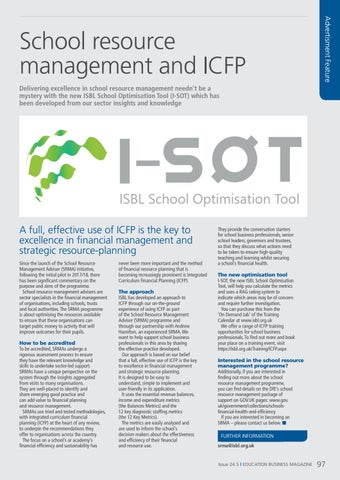Advertisment Feature
School resource management and ICFP Delivering excellence in school resource management needn’t be a mystery with the new ISBL School Optimisation Tool (I-SOT) which has been developed from our sector insights and knowledge
A full, effective use of ICFP is the key to excellence in financial management and strategic resource-planning Since the launch of the School Resource Management Adviser (SRMA) initiative, following the initial pilot in 2017/18, there has been significant commentary on the purpose and aims of the programme. School resource management advisers are sector specialists in the financial management of organisations, including schools, trusts and local authorities. The SRMA programme is about optimising the resources available to ensure that these organisations can target public money to activity that will improve outcomes for their pupils. How to be accredited To be accredited, SRMAs undergo a rigorous assessment process to ensure they have the relevant knowledge and skills to undertake sector-led support. SRMAs have a unique perspective on the system through the insights aggregated from visits to many organisations. They are well‑placed to identify and share emerging good practice and can add value to financial planning and resource management. SRMAs use tried and tested methodologies, with integrated curriculum financial planning (ICFP) at the heart of any review, to underpin the recommendations they offer to organisations across the country. The focus on a school’s or academy’s financial efficiency and sustainability has
never been more important and the method of financial resource planning that is becoming increasingly prominent is Integrated Curriculum Financial Planning (ICFP). The approach ISBL has developed an approach to ICFP through our on-the-ground experience of using ICFP as part of the School Resource Management Adviser (SRMA) programme and through our partnership with Andrew Hamilton, an experienced SRMA. We want to help support school business professionals in this area by sharing the effective practice developed. Our approach is based on our belief that a full, effective use of ICFP is the key to excellence in financial management and strategic resource-planning. It is designed to be easy to understand, simple to implement and user‑friendly in its application. It uses the essential revenue balances, income and expenditure metrics (the Balances Metrics) and the 12 key diagnostic staffing metrics (the 12 Key Metrics). The metrics are easily analysed and are used to inform the school’s decision makers about the effectiveness and efficiency of their financial and resource use.
They provide the conversation starters for school business professionals, senior school leaders, governors and trustees, so that they discuss what actions need to be taken to ensure high‑quality teaching and learning whilst securing a school’s financial health. The new optimisation tool I-SOT, the new ISBL School Optimisation Tool, will help you calculate the metrics and uses a RAG rating system to indicate which areas may be of concern and require further investigation. You can purchase this from the ‘On Demand tab’ of the Training Calendar at www.isbl.org.uk We offer a range of ICFP training opportunities for school business professionals. To find out more and book your place on a training event, visit https://isbl.org.uk/Training/ICFP.aspx Interested in the school resource management programme? Additionally, if you are interested in finding out more about the school resource management programme, you can find details on the DfE’s school resource management package of support on GOV.UK pages: www.gov. uk/government/collections/schoolsfinancial-health-and-efficiency If you are interested in becoming an SRMA – please contact us below. L FURTHER INFORMATION srma@isbl.org.uk
Issue 24.5 | EDUCATION BUSINESS MAGAZINE
97
